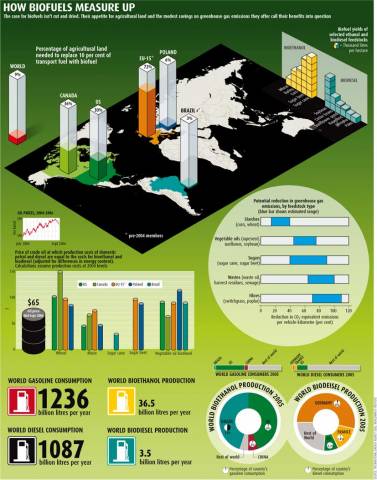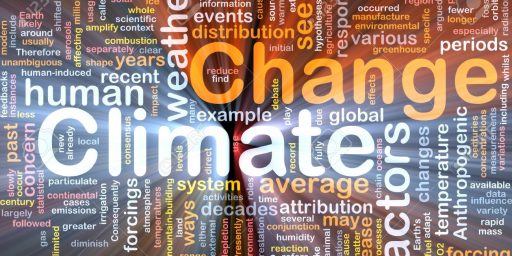Biofuels Cause Global Warming
 While ethanol and other biofuels have long been touted as a means of reducing greenhouse gas levels, it turns out that they have precisely the opposite effect because of some unintended consequences.
While ethanol and other biofuels have long been touted as a means of reducing greenhouse gas levels, it turns out that they have precisely the opposite effect because of some unintended consequences.
Almost all biofuels used today cause more greenhouse gas emissions than conventional fuels if the full emissions costs of producing these “green” fuels are taken into account, two studies being published Thursday have concluded. The benefits of biofuels have come under increasing attack in recent months, as scientists took a closer look at the global environmental cost of their production. These latest studies, published in the prestigious journal Science, are likely to add to the controversy.
These studies for the first time take a detailed, comprehensive look at the emissions effects of the huge amount of natural land that is being converted to cropland globally to support biofuels development. The destruction of natural ecosystems — whether rain forest in the tropics or grasslands in South America — not only releases greenhouse gases into the atmosphere when they are burned and plowed, but also deprives the planet of natural sponges to absorb carbon emissions. Cropland also absorbs far less carbon than the rain forests or even scrubland that it replaces.
Together the two studies offer sweeping conclusions: It does not matter if it is rain forest or scrubland that is cleared, the greenhouse gas contribution is significant. More important, they discovered that, taken globally, the production of almost all biofuels resulted, directly or indirectly, intentionally or not, in new lands being cleared, either for food or fuel.
[…]
The clearance of grassland releases 93 times the amount of greenhouse gas that would be saved by the fuel made annually on that land, said Joseph Fargione, lead author of the second paper, and a scientist at the Nature Conservancy. “So for the next 93 years you’re making climate change worse, just at the time when we need to be bringing down carbon emissions.”
[…]
The European Union and a number of European countries have recently tried to address the land use issue with proposals stipulating that imported biofuels cannot come from land that was previously rain forest. But even with such restrictions in place, Dr. Searchinger’s study shows, the purchase of biofuels in Europe and the United States leads indirectly to the destruction of natural habitats far afield.
Not to mention the fact that we’re converting a cheap, nutritious food source into an expensive, inefficient energy source and thus raising the price of the former. Or, as a commenter at Tyler Cowen‘s place notes, “causing many farmers to replace barley crops with corn which is leading to higher beer prices”
What’s particularly baffling is that the Europeans, who have been on the environmental bandwagon much longer than we have, get a substantial percentage of their energy from nuclear power whereas we haven’t built a new nuclear plant in a generation.
Image via a 2006 article in QJ.NET, demonstrating that the concerns documented in these studies aren’t new.






I feel obligated to point out that there are only three groups of people who have “long touted” ethanol etc. as a means of decreasing greenhouse gas emissions. Those groups are:
1) Farmers
2) The biofuels industry
3) Politicians pandering to groups 1 and 2
Most serious experts in the matter dismissed this type of biofuel production a long time ago.
Living in a primarily rural part of Alabama, I have seen the “unintended” consequences of biofuel production first hand. Ask any cattle farmer in the area, and he will tell you how not only has his fuel bill gone up, feed prices have risen dramatically creating a snowball of price increases in the food chain. Now instead of just gasoline prices being up, everything else goes up as well. Studies like this need more press.
You also forgot to mention that Brazil actually produces biofuels much cheaper than the US–however, Bush has been unwilling to get rid of the import tariff on ethanol.
Ethanol policy in the US is basically a giveaway to large agribusinesses.
I agree that subsidies on growing corn for use in ethanol production should be abolished.
However, I think that the subject is more complex than the conclusions that are being drawn here might suggest. For example, here in the U. S. we’re taking something between 800,000 and 3 million acres of agricultural land out of production per year simply because the land is more valuable for other purposes than it is for farming. The study quoted makes a land use argument. Have they taken that into account?
There are other complications as I pointed out in my post on this subject this morning.
It should also be recalled that corn isn’t the only possible crop for use in ethanol production here. I think that serious consideration should be given to switchgrass cultivation, specifically because of the land use issues raised by the Science article. Switchgrass can be grown on land that isn’t suitable for growing corn.
Triumph, I’m not sure than encouraging Brazil to produce more sugar cane is that great an idea. Although Lulu has rejected the idea so far, if the demand gets high enough the temptation to start clearing rainforest will rise, too.
This is a fine example of politics trumping common sense and science. Since everyone “knew” bio-fuels were a good idea and the “science was settled” it was time for large subsidies and government intervention.
So now we have wasted billions and can expect further visits from the law of unintended consequences leading to more wasted dollars. But we can’t wait to save the planet, we can’t wait for sound science. The tipping point is coming, the tipping point is coming.
“Since everyone “knew” bio-fuels were a good idea and the “science was settled’
Seems like this statement could be used for another core belief.
Since everyone “knew” Global-warming was a good idea and the “science was settled
Dave, I agree with your assessment–as well as our invocation of the switchgrass issue.
The major point being that we should look at what the reality of the bipartisan love affair with ethanol–its largely a giveaway to profitable companies with questionable positive affects on the environment.
I’m glad this is finally getting out in the mainstream. there have been whispers from those in the know for a while yet it goes against the green lobby. So not only will corn ethanol raise our food prices and make corn on the cob a luxury – it could make things worse environmentally.
The simplest solution is for people to eat less meat – especially cow meat. But that will take a lot of convincing.
Not to mention the fact that we’re converting a cheap, nutritious food source into an expensive, inefficient energy source and thus raising the price of the former.
Aren’t corn prices artifically, harmfully low as it is?
Steve and davod,
As Alex pointed out it was not the scientists promoting bio-fuels, particularly not corn as a resource for bio-fuels. Few who do not stand to directly profit from corn as bio-fuel source (or those who represent them) think it is a good idea.
It has been obvious from the outset to all who have chosen to educate themselves on the subject that the carbon footprint benefits of bio-fuels and environmental costs is highly dependent on crop choice and land use considerations. For instance, most moderately knowledgeable people knew from the beginning that converting Indonesian and Malaysian rain forest to palm oil plantations was a net negative for GHG emissions and a larger net negative for the environment. These articles and others did not create that understanding, rather they refined it.
The abstract of one of the two articles* is instructive.
The abstract** of another interesting article on the subject says,
In this case, as with global climate change, the science should be our guide. You seem to agree that science should be our guide re: ag subsidies for bio-fuels, why not for climate change?
* Fargione, J. el al (2008). Land Clearing and the Biofuel Carbon Debt. Science, Feb 8, 2008. (subscription required)
** full text requires subscription
Global warming is a scam and a farce but the need for cheap energy is not. Better that we make the push for nuclear and geothermal power, fuel cells and cheap hydrogen than to continue down the path of biofuel development.
This has been coming for a while now.
Just a few weeks ago the EU Commission got a report saying the same thing, but found it politically distasteful, so they did their best to ignore it.
I guess it was one of those “inconvenient truths“.
This is news? People didn’t already know this?
Ethanol production based on switchgrass is best described by the software industry term “vaporware” , lots of promises and no delivery.
Does this mean that biofuels from algae grown in deserts and during the winter, agriculture and forest product waste, sewage, trash and other sources should be discouraged? If a market for biofuels is established will it matter that some nations get theirs from non CO2 producing sources and others don’t? Given that the “CO2=climate change” hypothesis is weak, should we be discouraged from attempting a means of energy security that may be environmentally dangerous so as to maintain an insecure energy system which we are more strongly suspicious of being environmentally dangerous?
Responding to global warming has provided abundant rent seeking opportunities that both businesses and activist groups have both exploited.
An example of this is Robert’s comment
This comment shows a stunning ignorance of the root causes of environmental destruction, which is subsidies for grain production and mandates for biofuel usage.
Furthermore the comments on cow meat show even more ignorance by completely ignoring the fact that ranchers, raising cattle, have preserved massive amounts of carbon sinks in the form on natural range land habitats.
If you really are interested in preserving the environment push to end ag subsidies and biofuel mandates.
Furthermore, if you are really interested in eating ethically either.
1. Go vegan
2. If you can’t go vegan leave beef in your diet.
Cattle have far better quality of life then animals used to produce any other source of animal protein and it is the most ethical choice for animal protein in a diet.
Saul,
The problem is most, if not all, of the alternatives proposed to replace petroleum either end up
1. Using more petroleum to make then they replace or
2. Even if they aren’t energy negative can’t replace enough petroleum to make any impact on energy security.